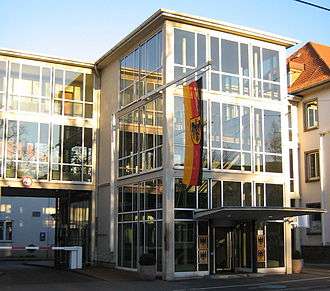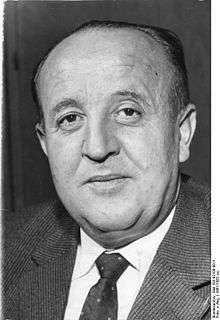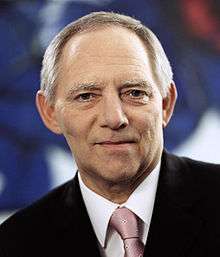Federal Ministry of the Interior (Germany)
| Bundesministerium des Innern (BMI) | |
 | |
| Agency overview | |
|---|---|
| Formed | 1 January 1879 as the Reichsamt des Inneren |
| Jurisdiction | Government of Germany |
| Headquarters |
Alt-Moabit 140 10557 Berlin 52°31′17″N 13°21′44″E / 52.52139°N 13.36222°ECoordinates: 52°31′17″N 13°21′44″E / 52.52139°N 13.36222°E |
| Employees | 1,500 |
| Minister responsible |
|
| Agency executive |
|
| Website | http://www.bmi.bund.de |

The Federal Ministry of the Interior (German: Bundesministerium des Innern), abbreviated BMI, is cabinet-level ministry of the Federal Republic of Germany. Its main office is in Berlin, with a secondary seat in Bonn. The current minister of the interior is Thomas de Maizière.
History
The Reichsamt des Innern (Imperial Office of the Interior) was the Ministry of the Interior of the German Empire. On the proposal of the Reichskanzler Otto von Bismarck in was created on 24 December 1879 by an Imperial decree from the Reich Chancellery. Like the other Imperial Offices it was directly under the control of the Reichskanzler. The seat of the office was in Berlin and it was managed by a Secretary of State, who from 1881 until 1916 also simultaneously held the office of Vizekanzler. The gazette for the publication of official notices was run by the Office from 1880. Entitled the Zentralblatt für das Deutsche Reich (ZBl), it had been published by the Reich Chancellery from 1873 until 1879.
With the Law on the Provisional Imperial Government of 11 February 1919, the Imperial Office became the Reichsministerium des Innern (RMI) (Imperial Ministry of the Interior) which remained the German Ministry of the Interior during the Weimar Republic and Nazi Germany. From 1923 until 1945, the ministry published the government gazette, which was entitled the Reichsministerialblatt (RMBl). On 1 November 1934 it was united with the Prussian Ministry of the Interior as the Reichs- und Preußischen Ministerium des Innern (Imperial and Prussian Ministry of the Interior).[1]
In 1945, the Imperial Ministry of the Interior was succeeded by the present Federal Ministry.
Responsibilities
The Ministry of the Interior is responsible for internal security and the protection of the constitutional order, for civil protection against disasters and terrorism, for displaced persons, administrative questions, and sports. It is host to the Standing Committee of Interior Ministers and also drafts all passport, identity card, firearms, and explosives legislation. The ministry also houses the Joint Anti-Terrorism Center formed in 2004 which is an information-sharing and analytical forum for all German police and intelligence agencies involved in the fight against terrorism.
Organization
State Secretaries
The minister is supported by two parliamentary state secretaries and two state secretaries who manage the ministry's various departments. One of the latter manages "P", "B", "IS" and "M" departments plus the crisis management cell and the working group on counter-intelligence development. The other supervises "Z", "G", "D", "O", "SP" and "V" departments plus the information technology director, data protection and freedom of information office and the doping task force.
Departments
- "P" Department (Abteilung P) is the ministry’s police department and has two branches: law enforcement and counter-terrorism. It analyses crime control issues and develops concepts and drafts laws to improve law enforcement and crime prevention efforts. It also manages the Federal Criminal Police Office, coordinates police support group deployments and represents federal interests in the sport and security arena. Due to Germany's federal structure, it can only promote internal security and public safety by cooperating with the state police forces and with agencies within the European Union (EU) and beyond.
- "IS" Department (Abteilung IS) is the internal security department that protects the German state against political extremism. It exercises supervisory control over the Federal Office for Constitution Protection, studies extremist groups and can ban them as a final resort. In addition, the department is responsible for the security of classified information and prevention of sabotage and espionage. It also manages civil defense and emergency management efforts at the national level and exercises supervisory control over the Civil Protection Center and Federal Agency for Technical Relief.
- "B" Department (Abteilung B) supervises and manages German Federal Police operations.
- "M" Department (Abteilung M) is responsible for immigration, integration, refugees and European harmonisation.
- "Z" Department (Abteilung Z) is the central office.
- "G" Department (Abteilung G) is responsible for policy, Europe and international developments
- "D" Department (Abteilung D) is responsible for the civil service.
- "O" Department (Abteilung O) is responsible for administrative modernisation and organisation.
- "SP" Department (Abteilung SP) is responsible for sport.
- "V" Department (Abteilung V) is responsible for constitutional, state, administrative and European law.
Special agencies
List of Federal Ministers of the Interior (since 1949)
Political Party: CDU CSU FDP SPD
| Name (Born-Died) |
Image | Party | Term of Office | Chancellor (Cabinet) | ||
|---|---|---|---|---|---|---|
| Gustav Heinemann (1899–1976) |
 |
CDU | 20 September 1949 | 11 October 1950 | Adenauer (I) | |
| Robert Lehr (1883–1956) |
 |
CDU | 11 October 1950 | 20 October 1953 | ||
| Gerhard Schröder (1910–1989) |
.jpg) |
CDU | 20 October 1953 | 13 November 1961 | Adenauer (II • III) | |
| Hermann Höcherl (1912–1989) |
 |
CSU | 14 November 1961 | 25 October 1965 | Adenauer (IV • V) Erhard (I) | |
| Paul Lücke (1914–1976) |
 |
CDU | 26 October 1965 | 2 April 1968 | Erhard (II) Kiesinger (I) | |
| Ernst Benda (1925–2009) |
 |
CDU | 2 April 1968 | 21 October 1969 | Kiesinger (I) | |
| Hans-Dietrich Genscher (b. 1927) |
 |
FDP | 22 October 1969 | 16 May 1974 | Brandt (I • II) | |
| Werner Maihofer (1918–2009) |
 |
FDP | 16 May 1974 | 8 June 1978 | Schmidt (I • II) | |
| Gerhart Baum (b. 1932) |
 |
FDP | 8 June 1978 | 17 September 1982 | Schmidt (II • III) | |
| Jürgen Schmude (b. 1936) |
 |
SPD | 17 September 1982 | 1 October 1982 | Schmidt (III) | |
| Friedrich Zimmermann (1925–2012) |
 |
CSU | 4 October 1982 | 21 April 1989 | Kohl (I • II • III) | |
| Wolfgang Schäuble (b. 1942) |
 |
CDU | 21 April 1989 | 26 November 1991 | Kohl (III • IV) | |
| Rudolf Seiters (b. 1937) |
 |
CDU | 26 November 1991 | 7 July 1993 | Kohl (IV) | |
| Manfred Kanther (b. 1939) |
 |
CDU | 7 July 1993 | 27 October 1998 | Kohl (IV • V) | |
| Otto Schily (b. 1932) |
 |
SPD | 27 October 1998 | 22 November 2005 | Schröder (I • II) | |
| Wolfgang Schäuble (b. 1942) |
 |
CDU | 22 November 2005 | 28 October 2009 | Merkel (I) | |
| Thomas de Maizière (b. 1954) |
 |
CDU | 28 October 2009 | 3 March 2011 | Merkel (II) | |
| Hans-Peter Friedrich (b. 1957) |
 |
CSU | 3 March 2011 | 17 December 2013 | ||
| Thomas de Maizière (b. 1954) |
 |
CDU | 17 December 2013 | Incumbent | Merkel (III) | |
References
- ↑ Stephan Lehnstaedt: Der „Totale Krieg“ im Reichsministerium des Innern unter Heinrich Himmler. In: Die Verwaltung. Zeitschrift für Verwaltungsrecht und Verwaltungswissenschaften. 39. Vol., 2006, pp. 393–420; Walter Strauß: Das Reichsministerium des Innern und die Judengesetzgebung. Aufzeichnungen von Doktor Bernhard Lösener. In: Vierteljahrshefte für Zeitgeschichte 9 (1961), part 3, pp. 262–313.
External links
| ||||||||||||||||||||||
|